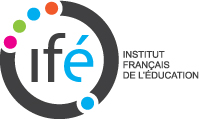Recherche
À l’interface entre recherches et pratiques professionnelles en éducation, l’IFÉ s’inscrit dans une logique de collaboration et de traduction entre les métiers de l’éducation et de la recherche. Il cherche ainsi à mettre en relation de diverses manières ces mondes, en produisant des ressources adossées au champ scientifique (théories, concepts, résultats, outils, méthodologies, etc.) et en contribuant au développement professionnel des métiers de la formation et de l’encadrement.
L’IFÉ apporte son expertise en traduisant et reproblématisant des travaux scientifiques en éducation, assurant ainsi leur appropriation par les professionnel·les. Cette expertise se double d’un appui à travers un accompagnement dans la conception et la mise en œuvre des projets. Il organise et anime des réseaux de recherche aux niveaux local, national et international, favorisant les collaborations inter-métiers et inter-institutionnelles.


